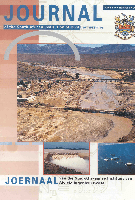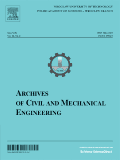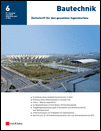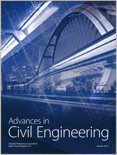
Civil Engineering Journal-Stavebni Obzor
Scope & Guideline
Fostering Collaboration for a Sustainable Future
Introduction
Aims and Scopes
- Structural Engineering:
Research on the design, analysis, and construction of various structures, including bridges, tunnels, and buildings, focusing on their stability, safety, and optimization. - Geotechnical Engineering:
Exploration of soil and rock mechanics as they pertain to construction, including studies on stability, bearing capacity, and ground improvement techniques. - Construction Management and Technology:
Investigation of modern construction methods, project management strategies, and the application of digital technologies and modeling in construction processes. - Environmental Engineering:
Examination of sustainable practices in civil engineering, including the impact of construction on the environment and strategies for waste management and resource optimization. - Transportation Engineering:
Studies on the design and operation of transportation systems, including roadways, railways, and tunnels, with a focus on safety, efficiency, and environmental impact. - Materials Science in Civil Engineering:
Research on the properties and performance of construction materials, including innovative materials and methods to enhance durability and sustainability.
Trending and Emerging
- Digitalization and Automation in Construction:
A significant increase in research focused on the use of digital tools, automation, and data analytics to improve construction processes and project management. - Sustainable and Green Building Practices:
Growing emphasis on sustainable construction methods, including the use of recycled materials and energy-efficient designs, reflecting a global trend towards environmental responsibility. - Advanced Materials and Nanotechnology:
Emergence of studies on advanced materials, including nanomaterials and composites, which enhance the performance and sustainability of construction materials. - Resilience and Disaster Preparedness:
Increased attention on designing structures that can withstand natural disasters, such as earthquakes and floods, highlighting the importance of resilience in civil engineering. - Smart Infrastructure and IoT Integration:
Research on the integration of Internet of Things (IoT) technologies into civil infrastructure for real-time monitoring and management, marking a significant trend in smart city developments.
Declining or Waning
- Historical Preservation:
While historical preservation remains important, the frequency of studies focusing on historical buildings and monuments has decreased, possibly due to a shift towards more contemporary engineering challenges. - Traditional Construction Methods:
Research centered on conventional construction methods has waned, likely as the field moves towards embracing modern technologies and innovative practices. - Local Environmental Impact Studies:
There has been a noticeable decline in localized studies focusing solely on environmental impacts of construction, as broader sustainability themes gain traction.
Similar Journals

Baltic Journal of Road and Bridge Engineering
Engineering Progress: Your Resource for Cutting-Edge ResearchThe Baltic Journal of Road and Bridge Engineering, published by RIGA TECHNICAL UNIV-RTU, serves as a pivotal platform for disseminating cutting-edge research in the fields of building and construction as well as civil and structural engineering. Established as an Open Access journal since 2006, it fosters global collaboration and accessibility to critical engineering knowledge, facilitating the exchange of innovative ideas among researchers, professionals, and students. With a commendable impact factor and recognition in Scopus rankings, where it stands in the third quartile for both relevant engineering categories, the journal underscores its significance in advancing the discipline. The journal aims to publish high-quality, peer-reviewed articles that address contemporary challenges in road and bridge engineering, making it an essential resource for anyone involved in infrastructure development and research. Located in Lithuania at 6B Kipsalas Street, RIGA LV-1658, this journal not only highlights the latest advancements but also seeks to inspire future innovations in engineering practices.

Revista de la Construccion
Empowering Professionals with Insights from the Construction FrontierRevista de la Construcción is a pivotal academic journal dedicated to the field of civil engineering and construction, published by the prestigious Pontificia Universidad Católica de Chile, Escuela de Construcción Civil. With its ISSN 0718-915X, this journal serves as a crucial platform for disseminating innovative research, case studies, and advancements in construction methodologies that address contemporary challenges within the industry. While currently not classified as open access, it provides valuable insights benefiting researchers, professionals, and students engaged in construction development and sustainability. The journal enhances the academic discourse and contributes significantly to knowledge in engineering practices, project management, and material science. Based in Santiago, Chile, the journal aims to foster collaboration and knowledge exchange among experts both locally and globally, making it an essential resource for those striving to advance the science and practice of construction.

CIVIL ENGINEERING
Shaping the Future of Infrastructure Through KnowledgeCIVIL ENGINEERING is a prominent journal published by the American Society of Civil Engineers (ASCE), dedicated to advancing the field of civil engineering since its inception in 1969. With an ISSN of 0885-7024, this journal spans a wide range of topics, including civil and structural engineering, geotechnical engineering, and materials science, reflecting its comprehensive coverage of the discipline. Although currently categorized in the Q4 quartile for several fields, the journal provides a platform for researchers, professionals, and students to present innovative solutions and research findings that push the boundaries of civil engineering practices. While it does not offer open-access options, its accessibility through institutional subscriptions ensures that critical research remains within reach for those intent on furthering their understanding and applications in the field. Conference proceeding articles, case studies, and theoretical papers contribute to its mission of fostering communication and knowledge exchange among civil engineering practitioners and scholars. The journal's commitment to quality and relevance in today's evolving engineering landscape makes it an essential resource for informed decision-making and professional development.

Journal of the South African Institution of Civil Engineering
Innovating the future of South African infrastructure.Journal of the South African Institution of Civil Engineering (ISSN: 1021-2019) is a distinguished open-access publication dedicated to advancing the field of civil engineering in South Africa and beyond. Established by the South African Institution of Civil Engineering (SAICE) and South African Institute of Steel Construction (SAISI), it serves as a critical platform for sharing research, case studies, and industry developments. The journal has been openly accessible since 2015, ensuring broader dissemination of knowledge among researchers, professionals, and students alike. Although it currently holds a Q4 ranking in Civil and Structural Engineering and is positioned within the lower percentiles in Scopus rankings, its commitment to fostering growth in the engineering sector remains strong. Covering various topics from structural design to innovative construction methodologies, the journal invites contributions that push the boundaries of current practices and methodologies. This publication is essential for those invested in sustainable engineering solutions, aiming to collaborate and contribute towards the evolution of civil engineering standards in South Africa.

Archives of Civil and Mechanical Engineering
Exploring Solutions to Engineering ChallengesArchives of Civil and Mechanical Engineering is a distinguished peer-reviewed journal published by SpringerNature, focusing on advancing the fields of civil and mechanical engineering. With an impressive Q1 ranking in both categories in 2023, this journal caters to a global audience, addressing the evolving challenges and innovations within these vital engineering disciplines. The journal has been a pivotal platform since its inception in 2006, and it continues to be essential for researchers and practitioners seeking to publish and access high-quality research. The absence of an Open Access option ensures that published works maintain rigorous academic standards, thereby enhancing their value within institutional repositories. With a robust impact factor and high visibility on Scopus—ranking #122 out of 672 in Mechanical Engineering and #74 out of 379 in Civil and Structural Engineering—this journal is an ideal venue for professionals, researchers, and students dedicated to advancing their knowledge and contributing to cutting-edge engineering practices. Based in Germany and operating internationally, the Archives of Civil and Mechanical Engineering invites submissions that address critical issues and solutions in contemporary engineering.

Civil Engineering Journal-Tehran
Elevating Global Standards in Civil and Structural Engineering.Civil Engineering Journal-Tehran is a premier academic publication focusing on the dynamic fields of civil engineering, construction, and environmental science. Published by C EJ PUBLISHING GROUP, this journal has garnered significant recognition, reflected in its impressive quartile rankings—ranking Q1 in Building and Construction and Civil and Structural Engineering, and Q2 in Environmental and Geotechnical Engineering. With its ISSN 2676-6957 and E-ISSN 2476-3055, this journal serves as a crucial platform for disseminating innovative research and advancements from 2019 through 2024. Notably situated at K N Toosi University of Technology in Tehran, Iran, it emphasizes both local and global perspectives on civil engineering challenges. Aiming to foster scholarly discourse, the journal is essential for researchers, students, and professionals dedicated to the evolution and sustainability of civil engineering practices.

Bautechnik
Advancing construction knowledge for a sustainable future.Bautechnik is a premier academic journal in the fields of Building and Construction and Civil and Structural Engineering, published by ERNST & SOHN in Germany. With a history dating back to 1969 and a significant converged timeline through various years, this journal offers a rich repository of peer-reviewed research dedicated to advancing the principles, methodologies, and innovations within its domains. Bautechnik is currently ranked in the Q3 category for both building and construction, as well as civil and structural engineering, indicating its relevance and contribution to the academic community. Though it does not offer open access, its curated content is accessible to a global audience of researchers, professionals, and students striving for excellence in their fields. The journal aims to foster discussions and disseminate knowledge that impacts the future of construction, architecture, and engineering practices.

Gradevinar
Unlocking Access to Cutting-Edge Engineering InsightsGradevinar, published by the Croatian Society of Civil Engineers-HSGI, is a leading Open Access journal in the field of Civil and Structural Engineering, with a significant history that dates back to its inception in 1980. This journal, with the ISSN 0350-2465 and E-ISSN 1333-9095, has established itself as a vital platform for disseminating innovative research and practical developments in civil engineering, particularly since it became Open Access in 2000, facilitating unrestricted access to its wealth of knowledge. As of 2023, Gradevinar is ranked in the third quartile (Q3) of Scopus’s Civil and Structural Engineering category, demonstrating its growing influence and relevance in the academic community, with a current ranking of #255 out of 379 journals in the field. Researchers, professionals, and students benefit from this journal's commitment to high-quality content that reflects the latest advancements and best practices in civil engineering, contributing to both technical proficiency and sustainable development in infrastructure projects across Croatia and beyond.

Electronic Journal of the Faculty of Civil Engineering Osijek-e-GFOS
Advancing Civil Engineering Knowledge Without BoundariesWelcome to the Electronic Journal of the Faculty of Civil Engineering Osijek-e-GFOS, a prominent platform dedicated to the dissemination of innovative research in the field of civil engineering. Published by the University of Osijek, this Open Access journal has been accessible to the global academic community since 2010, facilitating the sharing of knowledge and advancements without financial barriers. With an E-ISSN of 1847-8948, the journal aims to cover a broad scope of civil engineering disciplines, including structural engineering, geotechnics, environmental engineering, and construction management, among others. It serves as a crucial resource for researchers, professionals, and students, providing them with insightful articles and studies that contribute to the development of best practices in the field. By promoting open collaboration and knowledge sharing, the Electronic Journal of the Faculty of Civil Engineering Osijek-e-GFOS stands as a testament to the commitment of the University of Osijek to enhance the field of civil engineering through impactful research and educational outreach.

Advances in Civil Engineering
Pioneering Solutions for Sustainable DevelopmentAdvances in Civil Engineering is a leading peer-reviewed journal published by HINDAWI LTD, dedicated to advancing knowledge and innovation in the field of civil and structural engineering. Holding an esteemed Q2 ranking in the 2023 category for Civil and Structural Engineering, this journal serves as a vital platform for disseminating cutting-edge research and practical applications that address contemporary challenges in infrastructure development, sustainable design, and material science. Launched in 2008 and operating as an Open Access journal since 2009, it promotes the free exchange of ideas by ensuring that all articles are accessible to researchers, professionals, and students globally. The journal is also indexed in Scopus, ranking at #142 out of 379 in its category, situating it within the 62nd percentile of its peers. With a focus on interdisciplinary collaboration and innovative solutions, Advances in Civil Engineering contributes significantly to the ongoing evolution of engineering practices and education, making it an essential resource for anyone involved in or studying the ever-evolving field of civil engineering.